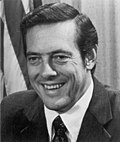| |||||||||||||||||
| |||||||||||||||||
 County results Sasser: 50–60% 60–70% 70–80% 80–90% Brock: 50–60% 60–70% 70–80% | |||||||||||||||||
| |||||||||||||||||
| Elections in Tennessee |
|---|
 |
The 1976 United States Senate election in Tennessee took place on November 2, 1976. Incumbent Republican U.S. Senator Bill Brock ran for re-election to a second term but was defeated by Democratic challenger Jim Sasser.
Contents
Several prominent Democrats ran in the Democratic primary. The most prominent was probably 1970 gubernatorial nominee John Jay Hooker; somewhat surprisingly to most observers however, the winner of the primary was Jim Sasser, who had managed Albert Gore Sr.'s 1970 re-election campaign.
Prior to his Senate re-election run, Brock was among those considered to replace Nelson Rockefeller as President Gerald Ford's running mate in the 1976 election. [1] [2]

